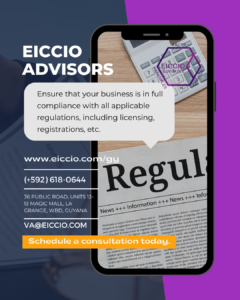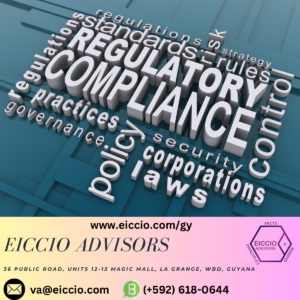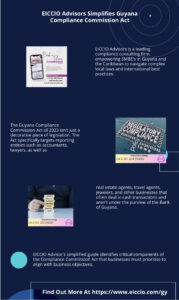Sep 5, 2023 | Financial Services
Master Corporate Compliance in Guyana
Introduction
Corporate Compliance in Guyana isn’t a buzzword; it’s an operational imperative. If you’re running a business in this rapidly evolving economy, compliance should be on the top of your priority list. This isn’t a chore; it’s a strategic move that safeguards your reputation and sets the stage for sustained growth. So, sit tight as we navigate through the essentials and intricacies of corporate compliance.
Understanding the Basics of Corporate Compliance
Let’s not make it complicated. Corporate compliance is all about adhering to the rules—both external and internal—that govern your business. From fiscal reporting to how you manage your team, compliance is your unsung organizational hero, working silently in the background to keep you in the clear.
Key Regulations and Laws to Be Aware Of
Time to get specific. If you’re operating in Guyana, you’ve got to know your rules:
- Guyana Compliance Commission Act 2023: A non-negotiable for any non-banking entity.
- Guyana Data Protection Act 2023: This one aligns closely with Europe‘s GDPR, so take note.
- Real Estate Agents and Brokers Act 2023: Essential if you’re in the property business.
Ignorance is not bliss here. Ignorance is a one-way ticket to legal trouble.
The Role of a Compliance Officer
Picture this: Your compliance officer is your organization’s internal watchdog. Their role?
- Spotting risks
- Organizing training
- Auditing for compliance
- Reporting to the top brass
Your compliance officer is the lynchpin, the go-to expert for keeping your business in line and in the clear. Compliance Officers can help your business to master corporate compliance in Guyana.
Best Practices for Managing Corporate Compliance
Effective compliance is not a ‘set it and forget it’ game. It’s dynamic, requiring continuous risk assessments, up-to-date training, and a robust reporting mechanism. Yes, it’s a lot of work, but it’s work that pays off.
Avoiding Common Pitfalls
Let’s face it, mistakes happen. But in the realm of compliance, mistakes can cost you dearly. A lack of executive buy-in, skimping on training, or poor data management can rapidly become a slippery slope towards non-compliance. So, what do we do? We stay vigilant and proactive.
Evaluating the Effectiveness of Your Compliance Program
Measurement is key. You’re not running a compliance program just for the sake of it. Utilize metrics to gauge its effectiveness. Anything less is just a shot in the dark.
The Role of Culture in Compliance
Compliance isn’t a department; it’s a culture. Whether you’re the CEO or an intern, a culture of compliance makes everyone a stakeholder in the business’s success. It’s not ‘them;’ it’s ‘us.’
Benefits of a Robust Corporate Compliance Program
The perks? Beyond just keeping you out of the courtroom, a robust compliance program boosts your corporate image, strengthens investor trust, and mitigates legal risks. It’s like a multi-vitamin for your business, but better.
Monitoring and Adapting Your Compliance Strategies
The rules of the game change. It’s vital to keep your ear to the ground and adapt. Failure to do so is not just risky; it’s business malpractice.
Regulatory Compliance and the Gig Economy
Hey, gig workers are part of the game too! Inclusion of freelancers and contractors in your compliance plans isn’t just good practice; it’s essential.
Why Choosing EICCIO Advisors is the Smart Move
Navigating the labyrinth of compliance isn’t for the faint of heart. This is where EICCIO Advisors shine. Tailored solutions, unmatched expertise, and a proactive approach make them the go-to compliance ally for any business in Guyana. Led by Theon Alleyne, a former Wall Street regulatory and compliance guru, EICCIO Advisors are not just consultants; they’re your business’s safeguard for corporate compliance in Guyana. They can even act as your outsourced compliance officer and aid in your mastery of corporate compliance in Guyana. Contact them via WhatsApp at +592-618-0644. Trust us, it’s the call your business needs.
Conclusion
Corporate compliance in Guyana is a continuous journey, not a destination. By mastering these elements, you’re not just avoiding trouble—you’re fortifying your organization for sustainable growth and success. Compliance isn’t a cost; it’s an investment. An investment in your future and the integrity of your business.
FAQs
- What is Corporate Compliance?
- Corporate compliance is the practice of adhering to laws, regulations, and internal policies within an organization.
- Who is a Compliance Officer?
- A Compliance Officer is responsible for ensuring that an organization adheres to all legal and internal rules and regulations.
- Why is EICCIO Advisors recommended for compliance in Guyana?
- EICCIO Advisors offer tailored solutions, have unmatched local and international regulatory expertise, and are led by Theon Alleyne, a Wall Street Regulatory and Compliance expert.
- How does a strong compliance program benefit a business?
- It enhances the corporate image, strengthens investor trust, and reduces legal risks.
- Is compliance relevant for gig workers?
- Yes, as the gig economy grows, it’s crucial to include freelancers and contract workers in your compliance plans.
Sep 2, 2023 | Compliance, Financial Services, Privacy, Regulation
Introduction
In today’s rapidly evolving business landscape, every industry—be it healthcare, finance, or technology—is governed by an intricate web of laws and regulations. Compliance isn’t just a legal necessity; it’s a vital part of building trust with customers, stakeholders, and society at large. If you’ve been wrestling with these complexities and need someone to steer the compliance ship smoothly, then hiring a corporate compliance consultant could be a game-changer. But what exactly do these professionals do, and how can they help your organization? Keep reading to discover all you need to know!
What is a Corporate Compliance Consultant?
A corporate compliance consultant in Guyana is not just a glorified advisory role; it’s a critical function aimed at helping businesses of all sizes navigate the labyrinthine corridors of regulatory obligations. These consultants specialize in specific industries and offer tailor-made solutions to ensure a company remains on the right side of the law. Their services range from designing compliance programs to providing actionable solutions that mitigate regulatory risks. They are your organization’s guardians, continually monitoring activities to ensure they align with the complex legal, security, and industry standards.
Corporate compliance consultants bring a vast reservoir of experience and expertise to the table. They can detect areas of non-compliance that might be invisible to a layman or even to professionals within an organization. By systematically reviewing internal operations and dissecting the nuances of applicable regulations, they provide a road map to legal safety. In essence, they’re the modern-day knights in shining armor for any business operating in a regulated environment.
The Historical Context of Corporate Compliance
Before diving deeper into what corporate compliance consultants do, let’s take a trip down memory lane. The concept of corporate compliance isn’t new; it has been around since businesses have existed. However, the idea gained significant traction after the financial scandals of the early 2000s, such as the Enron and WorldCom fiascos. These events shook the corporate world, leading to the introduction of stricter laws like the Sarbanes-Oxley Act in the United States. In Latin America and the Caribbean, Corporate Compliance has been focused more on anti-money laundering (AML), and Counter-Terrorism Financing (CTF). As a result, several contrite have enacted Compliance Commission legislation.
Why Compliance Matters More Than You Think
While compliance might seem like a grueling task, its implications are far-reaching and can affect almost every facet of your business. Poor compliance management can result in hefty fines, legal repercussions, and even criminal charges against company executives. But the buck doesn’t stop there; non-compliance can also tarnish your corporate image, creating a ripple effect that harms customer trust and stakeholder relations.
Non-compliance is not just about fines and legal hassles; it’s also a matter of corporate ethics. Companies seen as ‘good citizens’ are more likely to attract and retain customers, partners, and top-tier employees. Being compliant with laws and regulations projects an image of responsibility, safeguarding your brand and making it more appealing in the eyes of the public.
The Day in a Life of a Compliance Consultant in Guyana
When you hire a compliance consultant, you’re not just getting an expert in rules and regulations; you’re gaining a strategist, a risk manager, and often a confidante. A typical day for these professionals might involve a whirlwind of activities, from dissecting legal documents and auditing internal processes to conducting staff training.
Corporate compliance consultants are also excellent communicators. They bridge the gap between different departments within a business, ensuring everyone is on the same page regarding compliance matters. They’ll meet with executives, legal teams, and even frontline employees, sharing insights and updates while seeking feedback to refine compliance strategies.
Core Responsibilities of a Compliance Consultant
The responsibilities of a compliance consultant are as varied as they are vital. They extend beyond just interpreting laws or filling out paperwork. A consultant often begins by conducting a comprehensive risk assessment of your business, identifying areas where you are most vulnerable to compliance failure. Afterward, they may assist in the development of policies and procedures that align with both company goals and legal requirements.
Beyond this initial setup, compliance consultants also take on the role of educators, training employees on the importance of following these newly established guidelines. They may use a variety of tools to track compliance metrics, providing you with regular reports that give an in-depth view of how well your organization is adhering to its legal responsibilities.
Sectors That Often Need Compliance Consulting
While almost every industry has to adhere to some form of regulation, certain sectors are particularly fraught with intricate rules and high stakes, making the services of a corporate compliance consultant indispensable. One such sector is leisure and travel industry, which will be governed by Compliance Commission Act of 2023. Financial services is another sector where the stakes are high. Institutions must comply with regulations like GDPR, which concern everything from data protection to transaction transparency. Guyana now has a Data Protection Act of 2023.
The technology sector is not far behind, with laws around data privacy and cybersecurity, coming into the picture. Energy and utilities, transportation, and pharmaceuticals are other examples of sectors where regulations are complex and ever-changing. In these industries, a corporate compliance consultant doesn’t just add value but is often considered a necessity for ensuring ongoing operations and mitigating risks. Having an experienced Corporate Compliance Consultant in Guyana will be critical for sector success.
Designing and Implementing Compliance Programs
The design and implementation of a robust compliance program are among the most critical services provided by corporate compliance consultants. The process typically starts with a comprehensive risk assessment to identify areas where an organization may be vulnerable to regulatory non-compliance. Using these insights, the consultant develops a customized program aligned with both the company’s business objectives and the relevant laws and regulations. This program often includes written policies, procedures, and controls that provide a framework for compliant behavior. A well rounded Corporate Compliance Consultant in Guyana will have experience implementing Corporate Compliance Programs.
But the consultant’s role doesn’t end with the program design. Implementation is equally critical. This often involves educating employees through workshops, webinars, or one-on-one training. Consultants may also help set up internal reporting mechanisms like hotlines or anonymous tip boxes, where employees can report suspicious activities without fear of retaliation. Monitoring and enforcement are the final pieces of the puzzle. Compliance consultants often use sophisticated tracking tools and software to ensure that the compliance program is not just a document gathering dust but a living, breathing part of the corporate culture.
Risk Management: Compliance Consultants at the Forefront
In the realm of corporate governance, risk management and compliance are two sides of the same coin. Compliance consultants are often at the forefront of risk management initiatives, employing a variety of techniques to identify, assess, and prioritize risks. They collaborate closely with different departments, from legal to operations, to ensure that the risk mitigation strategies align with broader business objectives. Whether it’s data breaches, operational hazards, or legal liabilities, a skilled compliance consultant can offer frameworks and tools to manage these risks effectively. They can also prepare a business for unexpected scenarios through crisis simulations and disaster recovery planning. By proactively managing risks, a compliance consultant helps to not only avoid legal issues but also protect the organization’s reputation and financial well-being.
The Pros and Cons of Hiring a Corporate Compliance Consultant in Guyana
Pros:
- Expertise: A specialized compliance consultant brings a wealth of knowledge and expertise in navigating complex regulations, which may not be available in-house.
- Efficiency: With a consultant focusing solely on compliance, businesses can deploy their resources more effectively on their core operations.
- Risk Mitigation: A compliance consultant can identify areas of vulnerability and recommend solutions, thereby reducing the likelihood of costly legal complications.
- Education: Consultants often offer training sessions and workshops to educate staff on compliance matters, fostering a culture of awareness and proactive behavior.
- Adaptability: As regulations change, a compliance consultant can quickly update compliance programs to reflect new legal landscapes, ensuring that the business remains compliant.
Cons:
- Cost: Hiring a specialized consultant can be expensive, and not all businesses may have the budget for it.
- Dependence: Over-reliance on an external consultant may inhibit the development of internal compliance capabilities.
- Alignment: There’s a risk that the consultant may not fully understand the unique needs and culture of the business, leading to recommendations that are difficult to implement.
- Confidentiality: Bringing in an outsider involves sharing sensitive information, which may present a security risk if not managed carefully.
Qualifications and Skills Required
When considering hiring a compliance consultant, you’ll want to scrutinize their qualifications and skills closely. Relevant educational background in law, finance, or a specific industry sector can be a strong indicator of competence. Professional certifications in compliance or risk management add further credibility. Experience is often crucial; look for a consultant who has a proven track record in managing compliance issues in your sector.
Soft skills should not be overlooked. The consultant will need to communicate effectively with stakeholders at all levels, from board members to entry-level employees. Problem-solving skills are essential, as is the ability to think critically and adapt to changing circumstances. Lastly, strong ethical standards are a must, given the sensitive nature of compliance work.
Selecting the Right Compliance Consultant for Your Business
Choosing the right compliance consultant is a critical decision that could have long-term implications for your business. Start by clearly defining your needs and expectations. Are you looking for a generalist, or do you need specialized advice in areas like data protection or healthcare compliance? Once your needs are clear, you can begin researching and shortlisting potential consultants.
Ask for case studies that demonstrate their capabilities and success in solving compliance issues similar to yours. It’s also advisable to conduct interviews or initial consultations to gauge their understanding of your industry and specific challenges. Evaluate their communication style, problem-solving approach, and willingness to understand your business culture.
Cost is undoubtedly a factor, but it should not be the only one. Sometimes a higher-priced consultant may offer a level of expertise and service that pays off in the long run. Finally, make sure to discuss the terms of engagement clearly, including deliverables, timelines, and confidentiality agreements, to ensure a successful and mutually beneficial relationship.
Cost of Hiring: What to Expect
The cost of hiring a corporate compliance consultant can vary widely depending on various factors such as the complexity of the project, the consultant’s experience, and the industry in which your business operates. Here’s a breakdown of some common cost considerations:
- Hourly vs. Project-Based Rates: Some consultants charge by the hour, while others may offer a flat rate for a specific project. Make sure to clarify this upfront.
- Retainer Fees: For ongoing compliance needs, some consultants offer retainer agreements, which can be more cost-effective in the long term but require a regular financial commitment.
- Additional Costs: Beyond the consultant’s fees, there could be additional costs for things like software, training programs, and other resources recommended by the consultant.
- Travel and Expenses: If the consultant needs to travel to your location, you may also need to cover these costs unless otherwise stated in the contract.
It’s essential to budget for these costs and to weigh them against the potential financial and legal risks of non-compliance.
The Future of Corporate Compliance Consulting in Guyana
The demand for corporate compliance consulting is expected to grow as regulations become increasingly complex and as businesses become more globalized. The future may see a greater reliance on technology, with compliance consultants using advanced data analytics, machine learning, and AI to identify risks and recommend solutions more efficiently. There will also likely be a surge in specialized consultants focusing on emerging areas like cybersecurity, data privacy, and environmental sustainability. As companies’ responsibilities to stakeholders and communities become more intricate, compliance consultants will be at the forefront of helping navigate these complexities.
DIY vs. Professional Consulting: What’s the Right Choice?
DIY (Do-It-Yourself)
- Pros: Cost-saving is the most apparent advantage. With available online resources, smaller companies may be able to handle some compliance issues internally.
- Cons: Without expert advice, there’s a high risk of overlooking crucial compliance matters, which can lead to costly legal issues down the line.
Professional Consulting
- Pros: As mentioned earlier, the expertise and efficiency offered by a professional are hard to match. They can provide a comprehensive approach to compliance, reducing risks and ensuring that nothing is overlooked.
- Cons: The primary downside is cost, especially for smaller businesses. There’s also the potential for dependency on external expertise.
In conclusion, the right choice between DIY and professional consulting depends on your specific needs, the complexity of your compliance landscape, and your available resources. While smaller businesses with fewer compliance needs may manage with DIY approaches, those operating in heavily regulated industries will almost certainly benefit from professional consulting.
Why Selecting EICCIO Advisors is the Right Compliance Consultant for Your Business
EICCIO Advisors: Your North Star in the Guyana Compliance Landscape
Navigating compliance is not just complex; it’s a risky endeavor where a wrong turn could lead to significant legal repercussions and financial setbacks. EICCIO Advisors act as your dedicated guides through this challenging landscape, providing expert navigation and insight that ensures your business remains on the right side of the Guyana Compliance Commission Act 2023. With a proven track record and a deep understanding of both local and international regulations, they are more than just consultants—they are your compliance allies. Consider them your business’s guardian angels, always there to provide timely and relevant advice, preventing costly mistakes before they occur.
Tailoring Solutions to Your Needs
The beauty of working with EICCIO Advisors is that their services are not one-size-fits-all; they are specifically tailored to your business needs. Whether you’re a high-risk financial institution or a small retail operation, EICCIO Advisors have the expertise to assess your unique situation and develop a customized compliance program that not only meets legal requirements but also enhances operational efficiency. Led by Theon Alleyne, a former Wall Street Regulatory and Compliance Subject Matter Expert, the team understands that your business is unique and deserves a unique approach. This isn’t just about ticking boxes; it’s about creating a robust, sustainable compliance strategy that supports your business objectives.
Protecting Your Reputation and Bottom Line
In today’s fast-paced and ever-changing business landscape, maintaining a strong reputation is invaluable. One compliance misstep can not only result in severe financial penalties but can also tarnish your brand’s reputation, potentially causing irreversible damage. EICCIO Advisors offer more than just compliance services; they offer peace of mind. By ensuring that you’re always up-to-date with the latest regulations and by providing proactive risk management strategies, they safeguard your reputation and financial health.
If you’re looking for an outsourced Compliance Officer or expert guidance on navigating the intricate regulatory environment in Guyana, there’s no better partner than EICCIO Advisors. Available for consulting via WhatsApp at +592-618-0644, they are just a call away from helping you secure your business’s future.
Choosing EICCIO Advisors isn’t just a business decision; it’s an investment in the future and integrity of your organization. With their expertise, customization, and steadfast commitment to your business’s success, they truly are the right choice for any business operating in Guyana.
Conclusion
In the complex and ever-shifting terrain of compliance, particularly under the purview of the Guyana Compliance Commission Act 2023, having the right partner to navigate through the labyrinthine regulations is invaluable. EICCIO Advisors distinguishes itself as this indispensable partner. With their deep-rooted expertise, tailor-made solutions, and an unyielding focus on protecting your business’s reputation and financial standing, they offer more than just a service; they offer peace of mind and a strategic advantage.
Led by Theon Alleyne, a veteran in the realm of regulatory compliance, the team understands the unique challenges faced by businesses in Guyana and crafts bespoke solutions that are not just about ticking boxes but achieving sustainable compliance. By opting for EICCIO Advisors, you’re making a prudent investment in your company’s future, safeguarding against legal repercussions, and ensuring operational efficiency.
So, if you’re striving for more than just bare-minimum compliance—if you’re aiming for a robust, future-proof business—then there’s no better choice than EICCIO Advisors. Available for consulting calls via WhatsApp at +592-618-0644, they stand ready to elevate your business to new heights in compliance and operational excellence. Choosing EICCIO Advisors is not merely a transaction but a long-term commitment to excellence and peace of mind.
Frequently Asked Questions (FAQs)
- What Does a Corporate Compliance Consultant Do?
A corporate compliance consultant helps businesses understand and meet the regulatory and legal requirements specific to their industry. They may also design and implement compliance programs to minimize risk.
- How Much Does Compliance Consulting Cost?
The cost can vary significantly depending on the scope of work, the consultant’s expertise, and the industry in question. Some consultants charge hourly rates, while others may offer flat project-based fees or retainer agreements.
- Can I Manage Compliance Internally?
Yes, it’s possible, especially for smaller businesses with less complicated compliance requirements. However, managing compliance internally may expose the business to the risk of overlooking critical issues.
- What Qualifications Should a Good Compliance Consultant Have?
A qualified compliance consultant should have a strong background in legal and regulatory affairs, relevant industry experience, and ideally, relevant certifications. They should also possess strong analytical and communication skills.
- How Do I Select the Right Consultant for My Business?
Look for consultants who have experience in your specific industry and ask for case studies or references. Discuss your needs in detail to ensure they can offer the services you require. Consider the cost, but also weigh it against the potential value and risk mitigation they can provide.
Sep 2, 2023 | Compliance, Cryptocurrency, Ethics, Financial Services, Healthcare, Nonprofits, Privacy, Regulation

Guyana Compliance Commission Act 2023 Business Guide
Guyana Compliance Commission Act 2023 Business Guide
Introduction
Have you heard? On August 4, 2023, the National Assembly of Guyana stamped its approval on the Guyana Compliance Commission Act 2023. If you’re in the private sector—whether you’re a credit union, a law firm, or even a non-profit—listen up. This new legislation could change the way you do business.
What is the Guyana Compliance Commission?
Think of this Commission as the new sheriff in town. Created as an independent statutory body, it’s mandated to oversee non-financial businesses and non-bank financial institutions. Why? To make sure you’re following the rules, especially concerning Anti-Money Laundering (AML) and Countering the Financing of Terrorism (CFT).
Don’t Let Your Money Become a Tool for Bad Guys: Understanding AML and CFT
Now, let’s talk about something critical, something that should concern us all. You’ve probably heard the terms “money laundering” and “financing terrorism” in movies or on the news. These aren’t just Hollywood terms; they are real-life issues that can taint innocent money. Money laundering is when bad guys try to make their “dirty money” look clean by moving it around through different banks or businesses. Imagine you’re painting a room, but instead of walls, you’re coloring money to hide its true, illegal origins.
So, what should you do? First and foremost, be vigilant. If you’re running a business, be cautious when handling large sums of money from unverified sources. The same goes for strange, large transactions that don’t seem to have a clear reason. By doing so, you’re not just protecting your business, but you’re also making it harder for criminals to exploit financial systems.
Now, on to CFT—Countering the Financing of Terrorism. In simple terms, it means stopping money from getting into the hands of terrorists. Believe it or not, small donations from innocent people sometimes find their way into the hands of these malicious groups. A friend of mine thought he was donating to an NGO helping war victims; turns out, he was funding terrorism without even knowing it! So, double-check where your money goes. When you’re donating, especially online, ensure you’re giving to legitimate organizations. If in doubt, a quick Google search could save you a lot of heartache and legal trouble.
So here’s the deal: AML and CFT laws are here to protect us, but they can’t do it alone. It’s a collective effort. Let’s not let our hard-earned money be a tool for harm. If something feels off, don’t brush it off—report it. Because every cent that doesn’t go into the wrong hands is a victory in itself. And trust me, it feels good to be on the right side of this fight.
Decoding the Key Provisions of the Guyana Compliance Commission Act

Ensure that your business complies with Guyana Compliance Commission Act 2023. Call us to discuss.
Let me break this down for you: laws can be mind-numbingly boring but incredibly important. In Guyana, a law was passed that essentially created a watchdog organization. It’s called the Guyana Compliance Commission, and it has a huge responsibility: to make sure people and businesses are not laundering money or financing terrorists. So, what does this Commission do, and why should you even care?
How the Guyana Compliance Commission Functions, Anyway?
First things first, the Act turns the Guyana Compliance Commission into a legit, independent entity. Think of it as a person—a super-smart one whose sole job is to sniff out financial wrongdoings. It’s not part of any other organization; it stands alone. This independence is critical; it allows the Commission to do its job without outside influence. Trust me, you don’t want the wrong people pulling strings here.
Powers and Functions: The Nitty-Gritty
Next, let’s talk about the muscle and brainpower of this Commission. It has the authority to license and supervise businesses to ensure they’re not part of any shady money stuff. But that’s not all; it also has its eyes on international activities, helping other countries fight the same battles. It’s like your teacher not only checking your homework but also collaborating with other teachers to make the whole school better.
More Than Just Oversight
This Commission isn’t just a watchtower; it gets its hands dirty. It’s out there conducting tests, basically pop quizzes, to make sure businesses are playing by the rules. If a company isn’t, the Commission can enforce penalties. And get this, it has to cooperate with international bodies. So, if some overseas bank thinks it can get away with financing bad guys, they have another thing coming.
Delegation: Sharing the Load
Now, the Commission isn’t a one-person show. It can delegate tasks to committees or officers within its team, making it more efficient. However, when it comes to serious stuff like licensing, that power stays at the top. This ensures that the most critical decisions are made by the most experienced people.
Who’s in Charge Here?
Leadership matters, right? So, the Commission has a Chairperson and a Deputy Chairperson. These are the folks steering the ship, making sure it doesn’t go off course. They’re supported by a Chief Executive Officer, staff, and even outside experts when needed.
Show Me the Money!
Lastly, this Commission isn’t working for free. It has its own fund to make sure it can do its job without cutting corners. You wouldn’t expect a superhero to fight crime without a proper costume, would you? This fund is that costume—giving the Commission the tools it needs to protect us all.
The Guyana Compliance Commission is here to make sure that the bad guys don’t have an easy ride. Its creation, structure, and operation are more than just legal mumbo-jumbo; they’re part of the wall that protects you, me, and our money from being used for terrible things. So, when you hear about the Commission cracking down on a business or cooperating with other countries, know that it’s all for a good cause.
Registration Requirements

Corporate Compliance
Reporting and Registration: The Commission’s Iron Fist
Let’s zoom in on a fascinating part of this Commission’s role: registering and monitoring certain professionals. Yeah, you heard right! Accountants, lawyers, real estate agents—you name it. If they’re in the money game in any capacity, they need to register with the Commission. Why, you ask? Because it’s not just big corporations that can get involved in illegal money activities. Even your neighborhood accountant can be cooking the books, knowingly or not.
Why Registration Isn’t Optional
So, these reporting entities—your accountants, lawyers, and real estate agents—must register within a specific time frame set by the Commission. It’s not a suggestion; it’s a requirement. Ignore this, and there could be big trouble. This registration isn’t just a hoop to jump through. It’s a safeguard to make sure every financial move these professions make is transparent and above board. Think of it as a roll call in school; you have to be present and accountable.
The Stick Behind the Carrot
Now, here comes the juicy part. What happens if someone doesn’t follow the rules? The Commission isn’t all talk; it has teeth. If a reporting entity isn’t compliant, the Commission can take some pretty tough actions. We’re talking canceling, suspending, or revoking registrations. And if that’s not enough, it can also recommend that their licenses or memberships in professional bodies be suspended or revoked. This isn’t child’s play.
So, folks, if you ever thought laws like these are just pieces of paper, think again. They are the foundation of a system designed to keep our financial world clean and fair. Even those in trusted professions are not above these rules; in fact, they’re held to even higher standards. And if they don’t comply, the Commission has the tools and the power to make them regret it.
Who’s Who of Beneficial Ownership Requirements
Alright, let’s tackle another piece of this puzzle: beneficial ownership. Simply put, the Commission wants to know who really owns and benefits from your entity. You might be wondering, “Why do they care?” Well, it’s not just nosiness. Knowing who’s behind a business helps the Commission sniff out any suspicious or illicit activities. So, don’t think you can be all cloak-and-dagger about it. You’ve got to provide this information, and it better be accurate and updated.
Now, I can’t stress this enough: make sure your beneficial ownership information is up-to-date. Lives change. People move in and out of businesses. Maybe you’ve added a partner, or perhaps someone has cashed out. Whatever the case, update that information. Ignoring this crucial step could bring a world of pain, including legal repercussions. So, if you don’t want the Commission on your back, keep things transparent and current. Trust me, it’s easier to update a form than to untangle a legal mess.
Auditing: The Commission’s Secret Weapon

EICCIO Corporate Compliance
Let’s dive into another critical aspect of this Commission’s arsenal: the role of auditors. If you think you can just register and go on with business as usual, think again. The Commission demands that certain entities, particularly those with a higher risk profile, put internal audits and compliance officers into place. That’s not just a feel-good exercise. It’s a crucial part of ensuring that these businesses are sticking to the rules and not playing fast and loose with our financial system.
No Cutting Corners with Audits
So, here’s the deal: If the Commission considers you a higher-risk entity, you have to appoint an auditor. Not just any auditor, though. This person has to be approved by the Commission as being capable and a “fit and proper” individual. Every year, they’ll scrutinize your financials and your AML/CFT compliance functions. And you can’t drag your feet—these audited records must be sent to the Commission within three months of your financial year’s end. If you thought you could slack off once you register, you’re sorely mistaken.
A Game of High Stakes
But what happens if your auditor uncovers something fishy? Well, brace yourself because they’re mandated to report any issues like money laundering risks or other regulatory breaches straight to the Commission. Oh, and don’t even think about obstructing or hindering the audit. That’s not just a slap on the wrist—it’s a criminal offense. The system is rigged to ensure transparency and honesty, and auditors are the gatekeepers.
In summary, these audit requirements aren’t optional; they’re the backbone of a transparent, accountable financial system. They ensure that businesses aren’t just paying lip service to the law but are actually living up to it. And if they’re not, the Commission is geared up to take some pretty harsh steps. So, if you’re in this arena, you better play by the rules or prepare to face the music.
The Crucial Role of the Compliance Officer
Okay, folks, let’s talk about a job that’s critical yet often overlooked: the Compliance Officer. For those in reporting entities, especially the riskier ones, appointing a qualified Compliance Officer isn’t just good practice—it’s the law. And we’re not talking about choosing just any warm body to fill a chair; this individual needs to get a nod from the Commission first. This person becomes your frontline defense against dodgy transactions and legal headaches.
A Jack-of-All-Trades
Now, a Compliance Officer isn’t someone who just sips coffee and shuffles papers. Their responsibilities are huge, almost like they’re the Swiss Army knife of your operation. They train your staff on compliance, maintain a direct line of communication with the Commission, oversee the compliance manual, and file required reports. Yeah, it’s not a job for slackers. For small players, like sole traders, the Commission might let you off the hook and allow you to handle these functions yourself, but don’t take that as an invitation to cut corners.
The “Fit and Proper” Standard
And let me be clear: The Commission has a “fit and proper” test for the Compliance Officer. Just as we’d expect a goalkeeper to be agile and alert, we’d expect a Compliance Officer to meet certain standards. If they’re not up to snuff, they won’t get the Commission’s blessing. Period.
Whistleblowing is Not Optional, It’s Mandatory
If the Compliance Officer uncovers anything that smells like a regulatory breach or risk, they can’t just sweep it under the rug. They have to tell both the entity’s management and the Commission. That’s right, they’re obligated to spill the beans. We’re talking about a position of trust and accountability here.
Small Entity, Big Responsibility
In summary, while larger, riskier entities will likely need a separate Compliance Officer, smaller entities may get some leniency based on their size. However, don’t mistake this flexibility for laxity. No matter your size, the overarching rule is that you must abide by the Commission’s requirements, or face the consequences.
So, if you’re running a reporting entity or planning to set one up, get serious about appointing a top-notch Compliance Officer. Trust me, you don’t want to mess around with the Commission. Get it right, or risk getting booted out of the game.
Audit & Reporting
Annual audits are more than a recommendation; they’re a requirement. And the auditor needs to get a nod from the Commission. Discovering any financial foul play? The auditor has a duty to report it directly to the Commission.
Don’t Play Games with Noncompliance Penalties

Let’s talk about the Guyana Compliance Commission Act
Listen up, folks. The Guyana Compliance Commission isn’t messing around when it comes to breaking the rules. Noncompliance isn’t just a slap on the wrist; it’s a trip to the courthouse and a dent in your bank account. Take, for instance, the whole registration business. If you think you can get away without registering, think again. The Commission will slap you with a fine ranging from GYD 10 million to 25 million, and you could also find yourself behind bars for up to 5 years. And it’s not just about the initial registration; you’ve got to keep your details updated too. If you slack off, expect a fine of GYD 25,000 for every month you’re not up-to-date.
Audit Obstruction and False Information: A Road to Ruin
Now, let’s talk about audits. Nobody likes them, but they’re crucial for keeping things above board. If you obstruct an audit, that’s a one-way ticket to a GYD 20 million fine and potentially 5 years in the slammer. Fudging the facts won’t get you far either. Providing false or incomplete information to the Commission carries a penalty up to GYD 10 million and a prison term up to 3 years. Yeah, you read that right—3 years. And don’t even think about getting in the way of an authorized officer during an inspection. That’ll set you back up to GYD 3 million and could lock you up for 6 months.
The Bottom Line: Don’t Mess Up
Look, I’m not a scaremonger, but you need to understand that this is serious business. From administrative penalties that can go as high as GYD 10 million to daily fines of GYD 100,000 for ongoing non-compliance, the stakes are sky-high. Even dabbling in virtual assets after the allowed phase-out period can sink you with fines up to GYD 50 million and a 5-year prison term. So, let’s cut to the chase—follow the rules, keep everything transparent, and for heaven’s sake, don’t think you’re smarter than the law. It won’t end well.
International Teamwork: Not Just a Buzzword
Look, in today’s world, bad actors don’t just operate within one country’s borders. They’re international, so our countermeasures should be too. Thankfully, the Guyana Compliance Commission gets it. They have the power to work hand-in-hand with foreign agencies to boost compliance and keep tabs on cross-border shenanigans. It’s like having an extra set of eyes and ears abroad. Not just beneficial for Guyana, but also a win for foreign agencies that are fighting the same fight.

EICCIO Advisors Simplifies Guyana Compliance Commission Act
A Flexible Regulatory Framework: More than One Way to Enforce the Rules
Now, if you’re wondering, “Is the Commission the only sheriff in town?”, the answer is no. The Minister can appoint other bodies to join the regulatory rodeo. It means that if the Commission is swamped, or if another body is better suited for a specific task, the Minister can delegate responsibilities. This flexibility is fantastic because it makes the system more robust and less prone to bottlenecks. So, no excuses, folks. With multiple agencies potentially involved, compliance isn’t just recommended; it’s a must.
A Timeout for Virtual Assets: Here’s Why It Matters
Let’s talk about cryptocurrencies, stablecoins, and all that jazz. In simple terms, Guyana has hit the pause button on all this digital money stuff. Why? Because it’s crucial to have a rulebook that makes sense, and right now, they’re still writing that book. That’s why the law has laid down the law, specifying that until the end of 2025, a bunch of activities involving virtual assets are a no-go. We’re talking about exchanges, transfers, custody—basically, most of the things you’d want to do with digital assets.
The Phase-Out: A Buffer for Businesses
Now, don’t freak out if you’re already in this line of work. The government isn’t trying to ruin your business; they’re giving you time to wrap things up. You’ve got one month from when the law kicks in to tell the Commission what you’re up to. After that, you get another three months to wind down your operations. It’s like a “finish what you’re doing, but then you’ve got to stop” kind of deal. Honestly, it’s better than an abrupt, “stop right now,” don’t you think?
What You Can’t Do: A Laundry List of Don’ts
Under Section 72, the list of things you can’t do is pretty long. You can’t trade virtual currencies for real money or even other virtual currencies. You can’t transfer them or keep them safe for someone else. And don’t even think about joining the bandwagon of issuing new digital tokens or assets. Yeah, it might feel like a buzzkill, but these rules aim to protect everyone from financial mishaps and fraud. So, let’s bear with it for now, hoping for a more secure and regulated future.

EICCIO Advisors
How EICCIO Advisors Can Be Your North Star in the Guyana Compliance Landscape
Navigating compliance is like walking through a maze, except this maze has legal consequences and hefty fines for taking a wrong turn. That’s where EICCIO Advisors come in. Picture them as your go-to guides in the compliance wilderness, with a compass that points only to “compliant.” These folks are more than just consultants; they’re like compliance superheroes who know the ins and outs of the Guyana Compliance Commission Act 2023. From registering with the Commission to preparing your company for internal or independent audits, they cover it all. It’s like having a guardian angel who whispers, “Hey, maybe don’t do that” right when you’re about to make a costly mistake.
Tailoring Solutions to Your Needs: It’s Not One-Size-Fits-All
What makes EICCIO Advisors a cut above the rest is the tailor-made approach they take. Let’s be real: not every company has the same needs or faces the same risks. EICCIO Advisors get that. They’ll look at your specific situation—maybe you’re a high-risk entity or a small mom-and-pop shop—and they’ll customize a compliance strategy just for you. They’ll tell you if you need a dedicated compliance officer or if your business can handle its own compliance affairs. Think of it as a bespoke suit, but for your business, ensuring you’re not just compliant, but also efficient.
Why You Should Care: Protecting Your Reputation and Bottom Line
Look, in today’s world, your reputation is gold. A single misstep, one violation, and you’re not just looking at fines; you’re also staring down the barrel of a reputation nosedive. It’s not just about obeying the law; it’s about securing your company’s future. With EICCIO Advisors, you’re not just buying a service; you’re investing in peace of mind. They’ll keep tabs on you, ensure you’re updated with the latest regulatory changes, and even assist you in international cooperation requirements. So, if you want to keep sailing smoothly in the complex waters of compliance, my advice? Call EICCIO Advisors.
Remember, EICCIO Advisors, led by former Wall Street Regulatory and Compliance Subject Matter Expert Theon Alleyne, specializes in navigating these complex regulatory and operational challenges. We can even act as your outsourced Compliance Officer. Reach out to us via WhatsApp at +592-618-0644 to arrange a consulting call.
Final Thoughts on the Guyana Compliance Commission Act 2023: A New Era of Accountability and Opportunity

Book a Consultation with EICCIO Advisors
The Guyana Compliance Commission Act 2023 isn’t just a set of rules; it’s a landmark shift in the way businesses operate, pushing them toward greater transparency, integrity, and international cooperation. For those who get it right, it’s more than just avoiding fines or jail time; it’s about gaining a competitive edge and building a reputation that stands for trust and reliability. Don’t view it as a hurdle but as a chance to elevate your business standards. With this Act, Guyana is pulling up its socks, and if you’re doing business here, it’s time you pull up yours too.
This isn’t just about being on the right side of the law; it’s about being on the right side of history. The world is becoming a smaller place every day, and regulatory compliance is the bridge that connects different markets and opportunities. Whether you’re a local entrepreneur or an international business magnate, the Guyana Compliance Commission Act 2023 levels the playing field. And remember, if the complexities make your head spin, specialists like EICCIO Advisors are ready to guide you every step of the way. So don’t just comply—excel.
Frequently Asked Questions about the Guyana Compliance Commission Act 2023
- What is the Guyana Compliance Commission Act 2023?
- The Act is a legal framework that governs Anti-Money Laundering (AML) and Countering the Financing of Terrorism (CFT) in Guyana. It establishes the Guyana Compliance Commission as a statutory body to oversee compliance among various reporting entities.
- Who needs to register with the Guyana Compliance Commission?Reporting entities like accountants, lawyers, and real estate agents must register with the Commission within a specified timeframe to continue their operations.
- What happens if an entity fails to register or comply?The Commission can cancel, suspend, or revoke an entity’s registration and recommend further penalties. Financial penalties can range from GYD 10 million to 25 million and/or imprisonment up to 5 years.
- What are the auditing requirements under this Act?Higher-risk entities may be required to appoint an auditor to examine financial statements and AML/CFT compliance functions. The auditor must report any discovered issues to the Commission.
- What are the responsibilities of a Compliance Officer?
- The Compliance Officer oversees staff training, reporting, and compliance procedures. They must also report any regulatory breaches or risks to the entity’s management and the Commission.
Frequently Asked Questions Continued
- What are the rules regarding beneficial ownership?
- Reporting entities must provide accurate and updated beneficial ownership information to the Commission, as part of their compliance obligations.
- Can the Commission cooperate with foreign counterparts?
- Yes, the Commission can exchange information and cooperate with foreign counterparts to improve compliance and supervision.
- What are the limitations on virtual assets like cryptocurrencies?
- The Act restricts and phases out most commercial virtual asset activities until December 31, 2025, or another date set by the Minister.
- How can EICCIO Advisors help in this context?
- EICCIO Advisors are experts in corporate compliance consulting. They can help businesses navigate the complexities of the Guyana Compliance Commission Act 2023, ensuring they meet all legal requirements and avoid penalties.
- Is the Act all about penalties and restrictions?
- While the Act does impose penalties for non-compliance, its broader aim is to bring about greater transparency and integrity in business operations, aligning Guyana with international AML/CFT standards.
Feel free to reach out if you have more questions. It’s essential to stay informed and proactive in ensuring your business remains on the right side of the law.
Oct 27, 2020 | Compliance, Cryptocurrency, Financial Services, Regulation
Elevate your DeFi profile, and put compliance and regulatory risks to rest.

US regulators are looking for cryptocurrency sacrificial lambs. Digital assets business owners who ignore anti-money laundering (AML) laws are wearing a regulatory bullseye.
A case in point is the Seychelles-based cryptocurrency exchange BitMEX.
In July, Coindesk announced that BitMEX was under investigation by the U.S. Commodity Futures Trading Commission (CFTC).
The CFTC took the view that BitMEX was selling commodities to Americans without registration.
Then it’s COO, Angelina Kwan, the former MD and Head of Regulatory Compliance at HKEX, left, BitMEX.
On October 1, 2020, the CFTC charged the owners of BitMEX, Arthur Hayes, Ben Delo, and Samuel Reed.
The complaint alleged that BitMEX is an unregistered trading platform and violated multiple CFTC regulations, including failing to implement required anti-money laundering procedures.
If you operate a DeFi platform, I have good news for you.
You could elevate the reputation of your DeFi platform and put compliance and regulatory risks to rest.
With the appropriate DeFi Compliance program, you can avoid the allegation that the decentralized financial services you offer provide a money-laundering safe haven.
With the appropriate DeFi Compliance program, you can implement protocols to:
- Report malicious cryptocurrency addresses;
- Identify ransomware hacks and other types of fraud; and
- Block suspicious users and questionable funds from transacting on your DeFi platform;
Most importantly, you will have a solution for AML and Bank Secrecy Act (BSA) compliance, where necessary.
Remember, the Financial Action Task Force (FATF) regulations including the “Travel Rule” which requires Virtual Asset Service Providers (VASPs) to collect and transfer customer information during transactions.
Are you ready for positive press reports on your DeFi compliance protocols?
Oct 18, 2020 | Compliance, Cryptocurrency, Financial Services, Regulation

The hottest trend in blockchain is Decentralized Finance, also known as DeFi.
What is DeFi?
DeFi Pulse states that DeFI is “digital assets and financial smart contracts, protocols, and decentralized applications (DApps) built on Ethereum. In simpler terms, it’s financial software built on the blockchain that can be pieced together like Money Legos.”
Aha, money legos! That’s a concept even a child can understand. Borrowing, lending, hedging, exchanging, and trading of different crypto assets, are all activities in the money legos.
The Department of the Treasury is one United States agency responsible for regulating money. The Financial Crimes Enforcement Network (FinCEN) is one of the most well know divisions of Treasury. FinCen has a lot to say about cryptocurrency.
US Regulations impacting DeFi
FinCen first took a shot at blockchain-enabled digital assets in 2013. The initial guidance indicated that an administrator or exchange of cryptocurrency is a Money Service Business (MSB). This is significant because, MSBs must register with FinCen, and comply with the Bank Secrecy Act and the USA PATRIOT Act.
A MSB compliance program requires the implementation of processes to Know Your Customer (KYC). KYC is a system of documenting the personal and economic biography of a customer. Additionally, the MSB must ensure that the customer is not on a government-prohibited list for drug traffickers or terrorists.
European Regulations affecting DeFi
The European Union Directive (EU) 2018/843, also known as (“AML 5”), is now effective. This legislation is intended to bolster the methods and activities related to anti-money laundering and combatting the financing of terrorism (“AML-CFT”).
Some elements of the legislation include:
- restricting the anonymous use of cryptocurrencies;
- increasing the types of business subject to AML-CFT obligations; and
- and identifying the beneficial ownership of businesses.
In 2019, FinCen made it clear that you are engaged in the money transmitter business if you are involved in
“The acceptance of currency, funds, or other value that substitutes for currency from one person and the transmission of currency, funds, or other value that substitutes for currency to another location or person by any means.”
So what are DeFi promoters are really after? Global adoption of digital assets by people and businesses to new types of financial institutions using distributed ledger systems. Some of these financial titans tout the lower transaction fees, efficiency, fungibility between different ethereum products. Others promote faster confirmations and global reach of digital assets. In order words, a massive money transmitter business.
Some argue that pushing KYC and AML rules on DeFi platforms will negatively impact those who need Defi the most, the unbanked. While that may be true, the reality is that DApps are generally engaged in MSB activity, and must comply with the relevant laws.
DeFi and DApps Compliance
Innovators and creators DApps who seek to be successful in the long term must consider finding a compliance partner to provide advice, create and maintain the compliance function for the business. The right professional should be knowledgeable about corporate governance, compliance program management, financial crime compliance, and have a regulatory background.
Licenses are required to conduct the DeFi business in many countries and regions. A compliance professional skilled at managing regulatory applications helps reduce the legal costs of startups. The Financial services sector requires a steady hand.
The DApps compliance partner provides sound, consistent, and coherent compliance advice, interpretation, and recommendations on business initiatives, products, and policies. Most importantly, the professional takes a consultative approach to support the business. The incumbent also stays informed on the latest industry trends, news, and events that may impact the business.
Regulatory rain is coming to digital assets, the question is how long will it take for the industry to buy an umbrella?
Theon Alleyne is a former securities regulator, and SME on Broker-Dealer Regulation. He specializes in helping financial institutions to transform their risk and compliance program, including Financial Crimes Compliance (Fraud, AML, KYC, and Sanctions), and sales practice conduct risk.











Recent Comments